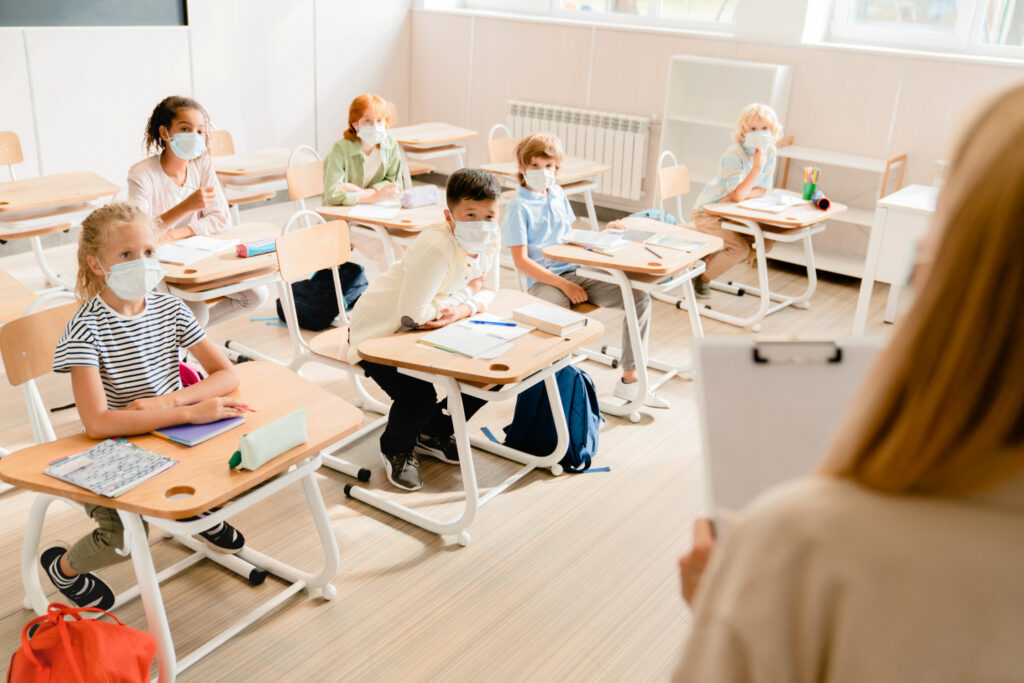A teacher checks the temperature of a child during the coronavirus pandemic
Most parents have many questions and predictions about what the 2022 school year will look like for their children. Unfortunately, without a crystal ball to see into the future, no one can know for certain what the next few months will bring.
Through the last 18 months, our children have become accustomed to wearing masks daily, spending their lunch breaks in demarcated areas, avoiding contact with their friends and being restricted from participating in their favourite sports and extra-mural activities.
While we welcome these extra safety precautions, it is sometimes difficult to see the light at the end of the tunnel. When looking at the possibilities of the year ahead, the worst-case scenario will have us face another hard lockdown with school closures, and the best-case scenario will have schools open with these safety restrictions still in place, with intermittent learning disruptions and closures through exposure to positive Covid-19 cases.
 School education during the pandemic.
School education during the pandemic.
The one thing we know for sure is that the traditional schooling environment has changed forever and our education providers have had to adapt (quite quickly) to these unprecedented circumstances.
While many schools introduced online and homeschooling learning solutions through the pandemic, many of these solutions were knee-jerk reactions to “cope” with the crisis. These unplanned approaches to remote learning have caused additional stress and disruption to students (and parents) and they are not a true reflection of what homeschooling and online schooling programmes should look like.
We chatted to some experts in the education industry to get their views on schooling through a pandemic, these are their personal experiences and their opinions of what parents and students can expect to see in 2022.
Jaun-Pierre Da Silva, Owner of Forever and More a CambriLearn Learning Partner said: “In 2020 and 2021, many parents from the traditional schooling environment found it difficult to keep track of their school’s teaching methods because each teacher used a different platform — some posted recordings on Google classroom, some used Zoom while others simply used WhatsApp. The learners were affected the most, as they now had to keep track of when they will have lessons, on which platform and they had to learn how to use the platforms. Most of the learners who would normally ask questions in the classroom got shy and this led to them not understanding the work.
“Learners suffered emotionally due to the lack of social interactions and they also had no sport, which had a large impact on their physical development. Luckily for us, as Cambrilearn education consultants, we were able to stay open during most of the lockdown. Our children and teachers already knew how to use the platform and learning could continue pretty much as if nothing had changed. Our learners’ marks remained very high and lessons were completed as planned. Our teachers weren’t under stress to cope with the new way of teaching because nothing really changed.”
Brett Garner, the Deputy Principal at CambriLearn, had this to say about schooling through a pandemic: “Every time a traditional school calendar is drawn up, it’s done with the knowledge that it is likely to change. The negative effects of this uncertainty on school administrators, teachers and students cannot be underestimated. Online and remote teaching solutions have become even more necessary, and schools with a robust, tried-and-tested online education solution will no doubt be able to offer their students the best of distance and in-person teaching. The need for this blended approach will bring with it an added measure of security, based simply on the fact that the online education component is overtly predictable.”
Let’s face it, the last two years have taken their toll, and one of the biggest challenges that parents, learners and educators will face in the upcoming school year will be mental health.
The overwhelming amounts of stress, anxiety and learning disruptions have been a lot for children to deal with. Educators and parents will need to start focusing on “damage control” through courses that focus on social and emotional learning (SEL). International OECD study Beyond Academic Learning highlights the direct correlation of academic success to good social-emotional skills. In other words, a child who has good social-emotional skills will more likely do well in school. For example, children who are strong in curiosity and persistence perform better at mathematics and reading.
Jannie Nel, from Eden Educational Services, says: “The pandemic has enabled students to use online tutors or online platforms for specialist subjects that are not offered at their school. The short courses and informal subjects, like the Social and Emotional Learning and Robotics courses offered by CambriLearn, are typical examples of how mainstream students will be able to enrich their curriculum. The willingness of homeschool service providers to collaborate with schools might be what is needed to restore trust in our education system.”
When choosing an education solution for your child, parents need to ask themselves: “Is an add-on online learning platform to a traditional school the best-case scenario to approach my child’s education, or should we be looking to existing homeschooling and online learning providers to find better solutions to cope with the 2022 school year?” Because, even if the solution is temporary, can your child afford another year of lost learning?